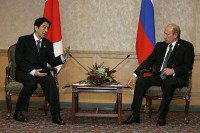Japan must Focus on Positive Relations with the Russian Federation: Energy, Geopolitics and Trade
Galina Zobova, Noriko Watanabe and Lee Jay Walker
Modern Tokyo Times
The government of Japan under Prime Minister Shinzo Abe needs to take a bold and urgent step to focusing strongly on the Russian Federation. Of course, America will remain to be a powerful pivot for the foreseeable future, yet if political elites in Tokyo are wise then the other powerful pivot could become the Russian Federation. After all, the military rise of China is gathering in pace, tensions are increasing in the South China Sea between various nations based on China’s increasing assertiveness, the Korean Peninsula remains volatile, China and Taiwan issues remain, energy issues remain problematic for Japan, the Malacca Straits and South China Sea could hinder energy supply routes based on various tensions – and other important factors remain. Therefore, it is essential for Japan to diversify its energy, to focus on new markets, to increase geopolitical safeguards and to have a solid relationship with a major regional and international power. This reality points to Japan forging powerful relations with the Russian Federation irrespective of constraints put on Tokyo by political elites in Washington.
It is widely believed that Abe will meet President Vladimir Putin of the Russian Federation in the middle of this year. Reports indicate that President Obama of America isn’t fully behind this. However, this should not concern Abe to any major degree because Japan is a sovereign nation. In other words, it is time for Japan to acknowledge that the post-war era is truly dead and that cordial relations between Tokyo and Washington must not impinge on Japan’s foreign policy. Indeed, it is imperative for Japan to become more independent in order to play a more international role, whereby the deeds of this nation are respected based on taking independent decisions.
Of course, the nation of America will continue to be an essential pivot for Japan but this sole dynamic is too narrow minded. Likewise, while Japan and the European Union (EU) have cordial relations this reality means little when it comes to Japan’s geopolitical concerns. Indeed, in recent times Japan is being dragged into the Ukraine dispute with the Russian Federation despite the Ukraine not being of any significance to political elites in Tokyo. This in itself highlights the need for Japan to become more independent. After all, America and the EU have dragged Japan into an anti-Russian Federation alliance when it comes to the Ukraine crisis. However, Japan can only gain more regional distrust because nations like China and the Russian Federation will see the move by Japan with being a puppet of Washington.
In fairness to Abe, while appearing to follow the mantra of G-7 nations, he is clearly intent on fostering stronger ties with the Russian Federation. Given this reality, Abe must not tie Japan to the usual issue of solving the territorial dispute based on a one sided view of history. Instead, political elites in Moscow and Tokyo should focus on the bigger picture that applies to geopolitics, increasing trade agreements, energy agreements, strengthening military ties, drawing Japan into closer relations with Central Asian nations, technological developments, increasing trade between Northern Japan and the Russian Far East – and other important issues.
Indeed, within Asia it is abundantly clear that the Russian Federation is blessed with powerful relations with Central Asian nations, China, India, Iran, Vietnam and a host of others. Equally important, the Russian Federation is an honest broker when it comes to the Korean Peninsula. In other words, a powerful piece in the regional and geopolitical jigsaw for Japan applies to fostering powerful relations with the Russian Federation based on mutual respect. Therefore, with Japan facing many concerns based on geopolitics and energy issues, it is clear that the Russian Federation is the missing piece in the jigsaw.
The Business Insider reports “At the end of 2014, Japan led all Asian nations with more than $14 billion in direct investment in the Russian economy – its investments in the oil and gas sector alone more than tripled China’s total contributions. Further, Japanese Prime Minister Shinzo Abe has set a national target to meet more than 40 percent of the country’s oil and gas demand in 2030 with Japanese firms’ equity output. Deeper ties are not simply a matter of if, but when and where.”
Japan must stop wasting decade after decade based on fusing powerful ties with the territorial dispute. Instead, the poor resource based nation of Japan must look to a regional power that can boost energy diversity. On top of this, the Russian Federation can enhance Japan’s geopolitical concerns and help political elites in Tokyo to reshape a more vibrant foreign policy. In other words, the role of the Russian Federation can enhance Japan’s relations with China and a host of other nations – while also being an honest broker when it comes to the Korean Peninsula. Therefore, if Japan can invigorate its foreign policy then America and the Russian Federation can both safeguard and enhance the future of this highly technological nation.
Modern Tokyo News is part of the Modern Tokyo Times group
DONATIONS to SUPPORT MODERN TOKYO TIMES – please pay PayPal and DONATE to sawakoart@gmail.com
http://moderntokyotimes.com Modern Tokyo Times – International News and Japan News
http://sawandjay.com Modern Tokyo Times – Fashion
http://moderntokyonews.com Modern Tokyo News – Tokyo News and International News
http://global-security-news.com Global Security News – Geopolitics and Terrorism
PLEASE JOIN ON TWITTER
https://twitter.com/MTT_News Modern Tokyo Times
PLEASE JOIN ON FACEBOOK

